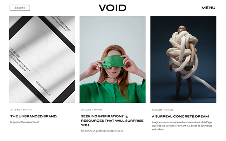- Nov 24, 2025
- 14 min read
Updated: Jan 29
Ready to let your work shine? Build your portfolio →

If you’re looking for writing portfolio examples to inspire your own, you’re in the right place. Strong examples help you understand how other writers present their work, communicate their style and attract the clients or publications they want.
A writing portfolio website brings all of that together in one place. It lets you showcase your best pieces, highlight your niche and give editors a clear sense of who you are as a writer. And you don’t need design experience to make it happen. Wix’s free website templates and intuitive builder make it simple to create a polished portfolio that reflects your voice.
Below, you’ll find writing portfolio examples from Wix users, followed by a clear, step-by-step guide to building your own.
Learn more about how to make a website with a website builder.

Showcasing your talent should be easy. With Wix’s portfolio builder, you can create a professional, eye-catching portfolio that shows your best work in just a few clicks. Wix’s customizable templates and easy-to-use tools let you present your skills with confidence–leaving a lasting impression on anyone who visits your site.
TL;DR: best writing portfolio examples
A great writing portfolio can help you land clients, apply for jobs or simply showcase your voice as a writer. In this guide, you’ll find standout writing portfolio examples—from journalists and copywriters to screenwriters and bloggers. Each one offers a different way to organize and present your work, so you can find a structure that fits your own writing goals.
You’ll also get practical advice for building your portfolio, including how to choose pieces, write a compelling bio and design a site that puts your writing front and center.
Learn more: What is a portfolio?
What to include in a strong writing portfolio
What to include | Why it works |
Your best writing samples | Showcases your voice, range and what you’re best at |
A clean, skimmable layout | Makes it easy for people to explore your work quickly |
Clear sections or tags | Helps organize your content by topic, style or format |
A short intro about yourself | Adds context and makes your site feel more personal |
Recent and relevant pieces | Keeps your portfolio fresh and aligned with your current work |
A thoughtful, simple design | Highlights your writing without distractions |
Easy way to get in touch | Makes it simple for editors or clients to reach out |
Learn more about how to make a portfolio for college.
11 best writing portfolio examples
01. Jed Donahue
Jed Donahue’s website is a great example of how speaking to your client’s pain points can compel them to reach out. The homepage header copy, “When you need great content, I’m here to help,” focuses on the customer’s needs. Testimonials from previous clients provide proof that Jed can deliver results. Meanwhile, the “What I can do for you” section gives a practical breakdown of the workflow and services that clients can expect.
Learn more: Why do I need a portfolio?

02. Sam Carlson
Sam Carlson takes his writing portfolio a step further by putting his client work front and center. He highlights his creative flair and prowess as a copywriter by including engaging introductions for each case study. Every project page boasts a concise and clever summary, followed by the client's logo and key project assets. Additionally, his "Fun" page, which presents his personal projects, offers a glimpse of his hobbies and talents outside of writing.

03. Lauryn Higgins
If you, like Lauryn Higgins, have an extensive writing portfolio that includes several bylines with well-known media companies, you can strategically add publication logos to your website and link them to your author pages to show off your credibility. On her “Awards and Publications” page, she features snapshots of some of her best clips, along with several awards.

04. Jessica Van Devanter
If you don’t have any visual content to display and don’t want to go through the process of finding a set of free-to-use visuals that match your branding and content, take a look at Jessica Van Devanter’s writing portfolio. By making the site’s design the focal point, she bypasses the need for external graphics or images that may not align with her branding.
Her logo, a shrewd-looking fox, serves as the background for the large header, which captures the viewer's attention upon arrival. Below it, a mountain graphic underlays the main content area, providing a sense of continuity without overpowering the text.
The structure of each page is reminiscent of a timeline, with her written works positioned as milestones, guiding visitors through her professional journey. The bright green and white font colors provide a deliberate contrast against the muted blue background, ensuring readability and drawing the eye to her written work.
Use Wix’s logo maker to start building out your personal brand.

05. Madison Gray
As a writer and an artist, Madison Gray masterfully demonstrates both skill sets throughout her portfolio. Pairing her highlighted works with original images draws visitors in and creates a visually engaging narrative of her talents. Each project page indicates which skills she utilized to complete the project, offering a comprehensive understanding of her multifaceted abilities.

06. Jane-Ellen Robinet
Jane-Ellen Robinet limits her writing portfolio to a page to help website visitors get the information they need quickly. The above-the-fold section summarizes her unique value proposition (“INSIGHT + PERSPECTIVE + EXPERIENCE”) and provides specific job titles for the services she provides (“Editor | Writer”). The header features anchor links to each section of the page to ensure easy navigation.

07. Christina Sterbenz
Rather than categorizing work by publications, Christina Sterbenz structures her portfolio page around writing topics and pairs each section with a compelling image from one of the relevant clips. This strategy adds visual appeal and gives each topic a personal touch, making the stories more approachable and intriguing to visitors. The images, paired with informative captions, humanize the subjects, enticing readers to delve deeper into her work.
In terms of website design, the portfolio benefits from a clean layout and a modern, minimalist font, which together enhance the site's readability and aesthetic appeal. Visitors can effortlessly scan the pages, finding what they are looking for without feeling overwhelmed. Additionally, the consistent use of design motifs—such as circles and lines throughout the site—contributes to a cohesive and memorable brand identity.
Like this format? Use this creative CV website template to get started.

08. Bryn Dippold
Bryn Dippold uses Wix’s blog maker to showcase her work samples. This approach of republishing content directly on her portfolio, rather than merely linking out to external publications, serves as a strategic method for keeping visitors on her site for longer and providing a comprehensive view of her work.
Many Wix website templates already come with an integrated blog. Alternatively, you can choose to add the blog feature to any template, tailoring it to fit your unique style. Wix allows you to customize the blog settings, enabling you to curate and present your best work in a manner that aligns with your professional image and goals.

09. Charlotte Kho
Charlotte Kho uses neutral colors, layered design elements and striking imagery to introduce herself as a digital and creative storyteller. The “Resume” page provides a lot of information, but its clean layout is easy on the eyes, and you have the option to download her CV. On the “Work” page, Charlotte offers a small selection of her best work, plus links to view more of her published pieces.
Like this layout? Make it your own as Charlotte did by customizing this business CV website template.

10. Maddie Pfeifer
Maddie Pfeifer effectively leads with her experience by featuring her resume on the homepage. It details her past work, highlights her skillset and lists the awards she has received in the course of her career. We appreciate that she prominently placed her contact information above the fold for easy accessibility.
Her website is a model of organization, making excellent use of Wix’s advanced menu features. The dropdown functionality in her navigation bar allows for an expanded array of options, enhancing the user experience. Visitors, when exploring the “Portfolio” page link, are greeted with the option to select content categories like “Event coverage” or “Crime & courts,” tailoring their browsing to their interests.

11. Rachel A.G. Gilman
Rachel A.G. Gilman elevates her homepage's simplicity with a playful, animated headshot, contrasting colors and a classic font choice, creating a dynamic first impression. Under the “Writing” tab, her comprehensive archive is meticulously sorted into distinct categories, making it easy to sift through her published work and accomplishments.

Start building your online portfolio with Wix today.
How to make a writing portfolio of your own
After exploring some of these portfolio examples, you’re probably eager to get started on learning how to make a portfolio of your own. Whether you're a seasoned writer or just getting started, these tips will help you present your work in a way that captivates and communicates your unique voice and skills.
01. Identify your target audience
To properly tailor your site design to your audience, you need to identify who you’re looking to impress. For instance, if you’re using this type of website to pitch to editors, you might consider spotlighting your best features or most impressive bylines. On the other hand, if you’re cultivating a professional portfolio for freelance clients, you might want to put testimonials or a list of services front and center.
02. Establish your goals
Setting clear goals is crucial to track your progress and success. If your objective is to boost engagement with freelance clients, you might measure this by the number of inquiries or project offers you receive through your portfolio site. On the other hand, if increasing your visibility as a writer online is your goal, you could focus on monitoring website traffic, page views, or how long visitors stay on your site. Regularly assessing these aspects will help you understand what's effective and what needs improvement in your portfolio.
03. Choose the right platform
When looking for a platform for your online presence, choose a portfolio website builder that aligns with your technical ability and the amount of time you can dedicate to maintenance. Although creating a bespoke website might be impressive and a simple clippings curator (such as Muck Rack) would be convenient, it’s a better idea to go for a builder that combines the best of both worlds, offering both customizability and convenience.
With Wix, you’ll have hundreds of customizable templates to choose from and AI tools that make designing and filling it with images a breeze. Furthermore, Wix enriches your website with features like built-in forms, custom email addresses, and newsletter capabilities, ensuring you can easily connect with your audience and maintain those connections effortlessly.
Check out this selection of Wix website templates for writers.
04. Decide how you want to structure your writing showcase
When building the “Works” or “Clips” section of your online writing portfolio, your focus should be on showcasing your writing as well as highlighting the outlets you've collaborated with. Select pieces that represent your best work and reflect the type of work you aspire to continue doing. Remember, it's always about quality over quantity. A handful of outstanding pieces will have a greater impact than a multitude of average ones.
If your portfolio includes creative writing samples, focus on capturing your unique voice and storytelling abilities. This could be anything from short stories and poetry to personal essays. Choose pieces that truly resonate with your style and demonstrate your range as a writer. You might also consider labeling these pieces under a dedicated section like “Creative Works” to make it easier for viewers to explore this side of your talents.
If you're at the beginning of your career and lack professional bylines, don't hesitate to include your best work from college or independent projects. Additionally, consider starting a blog that reflects the kind of work you aim to do professionally.
05. Build an archive of your work
Imagine losing your most valued work if a website goes down or a publisher removes your article. To prevent this, create an archive on your portfolio site. By uploading and publishing posts using the Wix content management system, you not only safeguard your work but also boost your site’s SEO and engage visitors more effectively. However, remember to check your contracts, as some publishers may restrict this. If time is limited, consider downloading your articles as PDFs and linking to them on a dedicated page. It's best to maintain this archive separately from your featured works, ensuring they continue to be the main attraction.
06. Flesh out the rest of your site, including key pages
Your writing portfolio is more than just your work; it's a complete presentation of your professional persona. Each page on your site plays a critical role in telling your story. Here's how to make them count:
Home: The homepage is your portfolio's front door, welcoming and guiding visitors. It's crucial that this page clearly communicates what you offer as a writer. Make sure visitors can instantly understand your area of expertise and writing style.
About: On your “About” page, detail your professional journey, educational background and skill set. This page is an excellent place to infuse personality into your resume. Consider including a PDF version of your resume so hiring managers can add it to their databases.
Contact: The “Contact” page is your open invitation for communication. Offer multiple methods to reach you, such as a contact form and an email address. Consider using scheduling software to make it easy for potential clients to set up consultation calls.
When writing the copy for these pages, make sure your tone is consistent, engaging and speaks to your desired audience. If incorporating imagery, make sure they’re high-quality, complement the text and reinforce your professional image. Each element should seamlessly blend to form a cohesive and inviting online presence.
Learn more:
07. Test and publish
Broken links, grammatical errors or faulty contact forms may lead visitors to doubt the quality of your work or discourage them from reaching out. Make sure to do a thorough assessment of your site, and consider sharing your writing portfolio with others to get their feedback.
08. Update your website
Regularly update your portfolio with your latest work. This keeps your site fresh and shows potential clients your active involvement and range of skills. A current portfolio can also inspire new project ideas among visitors.
How to come up with a great writing portfolio title
A strong title for your writing portfolio grabs attention and sets the tone. Here’s how to create one that stands out:
Make it relevant: Focus on your niche or expertise. Are you a creative copywriter, an engaging storyteller or an SEO expert? Show your strengths with titles like “Words That Sell” or “Stories That Connect.”
Keep it professional: Your title should reflect your skills while staying polished. Pair your name with your focus like “Alex Green | Creative Content Writer” for a clear and professional impression.
Show creativity: Use this as an opportunity to showcase your writing style. Play with wordplay or a touch of personality. A title like “Pen, Paper & Profits” is fun and clear.
Stand out: Choose a title that’s unique and memorable. Avoid generic options like “My Writing Portfolio.” Instead, spark curiosity with something like “Crafting Words That Work.”
Test and refine: Try different ideas and gather feedback. Small tweaks can make a big impact.
Types of writing portfolios
A well-curated portfolio is crucial for showcasing your skills and attracting opportunities. Different portfolios cater to specific careers, helping you effectively demonstrate your strengths and stand out in your chosen field. Let's explore the portfolio options that can help you excel professionally:
Freelance writing portfolio
Freelance writing portfolios compile a range of writing samples from various projects and clients, demonstrating versatility and adaptability across different topics and formats. This type of portfolio often includes blog posts, articles, copywriting samples and any other relevant work. Freelance portfolios are essential for attracting new clients and establishing a robust freelance career.
Learn more about how to make a copywriting portfolio.
Multimedia journalist portfolio
A multimedia journalist portfolio showcases your ability to tell stories across different platforms, including video, audio and digital media. This type of portfolio often includes samples of news articles, video reports, podcasts and interactive projects. Such portfolios are invaluable for journalists looking to highlight their skills, appealing to employers who prioritize cross-platform storytelling capabilities.
Copywriter portfolio
A copywriter portfolio is designed to display your skills in writing compelling marketing and advertising content. It typically features examples of ad copy, social media campaigns, email marketing and website content that highlight creativity and persuasion skills. This specialized portfolio helps copywriters attract clients or agencies that seek effective communication strategies to boost brand visibility and sales.
Niche-specific portfolios
Demonstrate your writing expertise in a particular genre or industry, such as travel writing, technical documentation or health and wellness content. By curating samples that highlight your specialized knowledge, you can appeal directly to niche markets or clients looking for an expert in your field. This targeted approach not only enhances your credibility but also increases your chances of attracting the right opportunities tailored to your strengths.
Creative writing portfolios
Highlight your ability to write engaging and imaginative stories, poetry or scripts. These portfolios often include a mix of published works, excerpts from larger projects and personal writing pieces that demonstrate a unique voice and style. They are particularly useful for writers pursuing careers in fiction, screenwriting or literary fields, where creativity and originality are key.
Blogger portfolio
A blogger portfolio illustrates your ability to engage an audience through personal storytelling and consistent content creation. It often includes a collection of blog posts, audience engagement metrics and collaborations with brands or guest posts on other platforms. This portfolio is ideal for bloggers looking to establish themselves as influencers or content creators, showcasing their unique voice and the ability to cultivate a dedicated readership.
Student/aspiring writer portfolio
For students or aspiring writers, a portfolio is a crucial tool for showcasing potential and growth. This type of portfolio might include academic papers, creative writing assignments and any published work from school publications. It serves as a platform to demonstrate writing skills and readiness for internships or entry-level positions in the writing field.
How to build a writing portfolio when you’re just starting out
You don’t need a long list of published work to create a compelling writing portfolio. What matters most is showing your range, your voice and your ability to write for the audience you want to reach. Here are a few practical ways to build a strong portfolio from scratch:
Write on spec
Create full articles on topics that fit your target industry. These pieces can demonstrate your style and expertise, and you can offer them to editors later if you choose.
Create mock samples
Draft hypothetical projects for real or fictional brands. As long as you clarify that they’re examples, mock samples can help clients visualize how you’d approach their content.
Try guest posting
Search for opportunities like “write for us + [your topic]” to contribute to niche blogs or online publications. Even one byline gives you credibility and a link back to your portfolio.
Once you have a few samples, bring them together on a clean, professional website. Wix makes it simple to create a polished writing portfolio without design experience.
Writing portfolio examples FAQ
What to consider when curating a writing portfolio as a student?
Diverse writing samples
Best quality work
Relevant pieces to your goals, whether its applying for a job or a new course
Clear organization
Brief context for each piece
Proper formatting and proofreading
Academic and extracurricular writing, to show diverse skills
Personal statement or bio
What to keep in mind when building a writing portfolio for job applications?
When building a writing portfolio for job applications, keep in mind:
Tailor content to target different jobs
Showcase diverse writing styles
Include relevant industry pieces to show experience
Highlight your best work
Keep it concise and well-organized
Provide context for each sample
Proofread and check for any errors
Update regularly
What makes a good writing portfolio?
A good writing portfolio highlights your strongest work and is tailored to the specific niche or genre you want to pursue. It should include samples that showcase your expertise, versatility and the ability to meet client needs, along with testimonials to provide social proof of your skills. Easy navigation and a clean, professional layout make it simple for viewers to explore your work. Lastly, your portfolio should reflect your personal style and brand, leaving a memorable impression on potential clients or employers.
What is included in a writing portfolio?
A writing portfolio typically includes a selection of your strongest writing samples, client testimonials and a brief personal bio. The samples should represent your expertise and showcase your skills in a specific niche or genre. You can also include information about past projects, such as your approach and the results achieved, to provide context and depth.
How many pages should a writing portfolio be?
A writing portfolio should prioritize quality over quantity. Aim for a concise selection of around 5–10 pages or samples that effectively represent your skills and versatility. The goal is to present just enough work to impress your audience while keeping their attention focused on your strongest pieces.
How do you start writing a portfolio?
Begin by identifying the specific niche or industry you want your portfolio to focus on. Gather your strongest and most relevant writing samples, along with any testimonials or client feedback. Then, create a clean, easy-to-navigate layout that showcases your work, starting with your best pieces to make a strong impression.
How do you write a portfolio example?
To create a portfolio example, start by selecting one of your best writing pieces that aligns with your target niche. Briefly introduce the piece by explaining the project goals, your role and the outcomes. Present the actual sample clearly and professionally, ensuring it reflects your abilities and style effectively.
What does a writing portfolio look like?
A professional writing portfolio should be hosted on a personal website or blog. Include relevant writing samples tailored to the roles you’re targeting, a brief author bio and easy-to-find contact information. If you don't have published work, create sample pieces that showcase your skills for the specific jobs you’re applying for. Keep the portfolio visually appealing and well-organized to highlight both your talent and professionalism.












